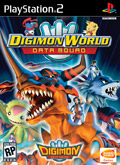Digimon World: Data Squad

TITLE Digimon World: Data Squad
GENRE RPG
PLATFORM PS2
DEVELOPER Namco Bandai
US PUBLISHER Namco Bandai
UK PUBLISHER Namco Bandai
NORDIC PUBLISHER Namco Bandai
ONLINE PLAY No
Media Screenshots:
SCREENS ADDED: 03 Aug-2007
Videos:
Official Fact Sheet:
Marcus Damon is both a smart 14 year old and an undefeated street fighter, but he does not fight with his fists alone. As a member of the secretive Data Squad (DATS), Marcus and his team are investigating the disappearance of numerous kids. During the course of the investigation, the Seven Demon Kings arrive in the world, wreaking havoc across the planet.
As Marcus, it is up to you to find the missing kids and defeat the deadly Seven Demon Kings and their evil minions. Team up with a large variety of Digimon to battle evil and solve complex puzzles together. As you and your Digimon partners increase in skill and find new items, your Digimon can be upgraded through leveling up and Digivolution. Control over 140 Digimon and evolve them to be powerful enough to save the world!
- Dozens of Digimon: As you travel through over a dozen stages, collect and evolve over 140 Digimon. Each Digimon has its own unique strengths and weaknesses, and upgrading your Digimon can be easily done through the intuitive Galactica Evolution System!
- Exciting new look and feel: Digimon World Data Squad is a new kind of RPG featuring cel-shaded artwork and emotive Digimon that are affected by the way you treat them!
- Digimon speak their minds: Digimon World Data Squad features a unique emotion engine for the Digimon, allowing them to communicate to the player what they would like to do in battle.
- Numerous items to wield: There are over 250 items to find and acquire during the course of the game. Some items will help you solve complex puzzles, while others will give you different advantages in battle. Find them all!
- Unique storyline and characters: Digimon World Data Squad features a storyline that parallels the new and exciting Digimon Data Squad cartoon, and also has new exclusive characters for the game! The same voice actors from the cartoon have brought their characters from the show to life in the game!



















